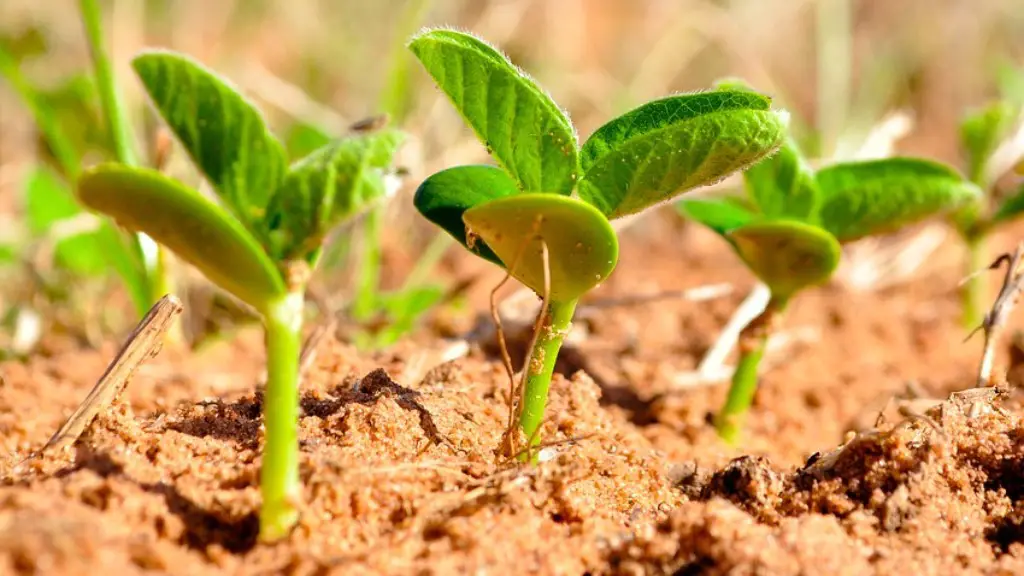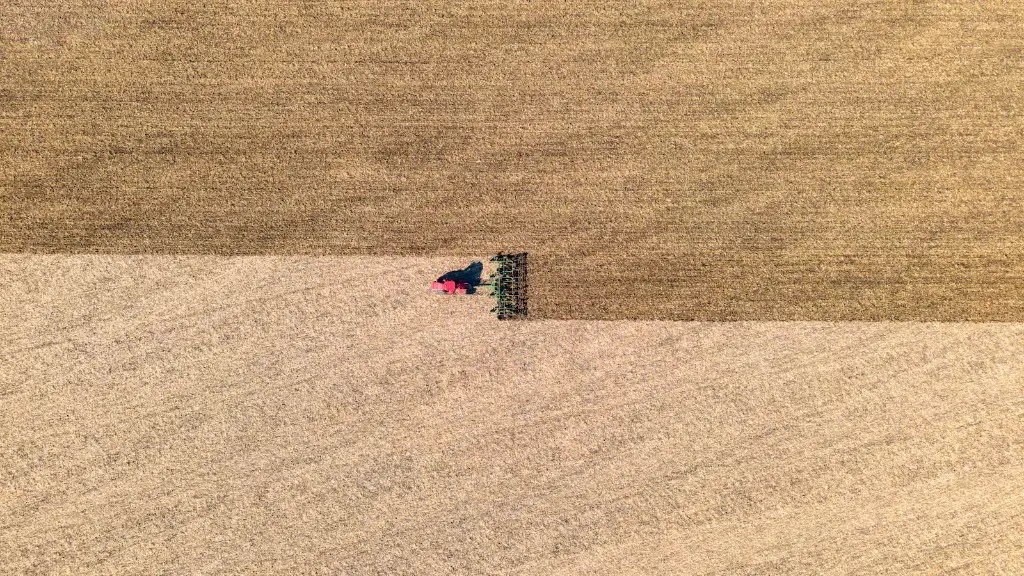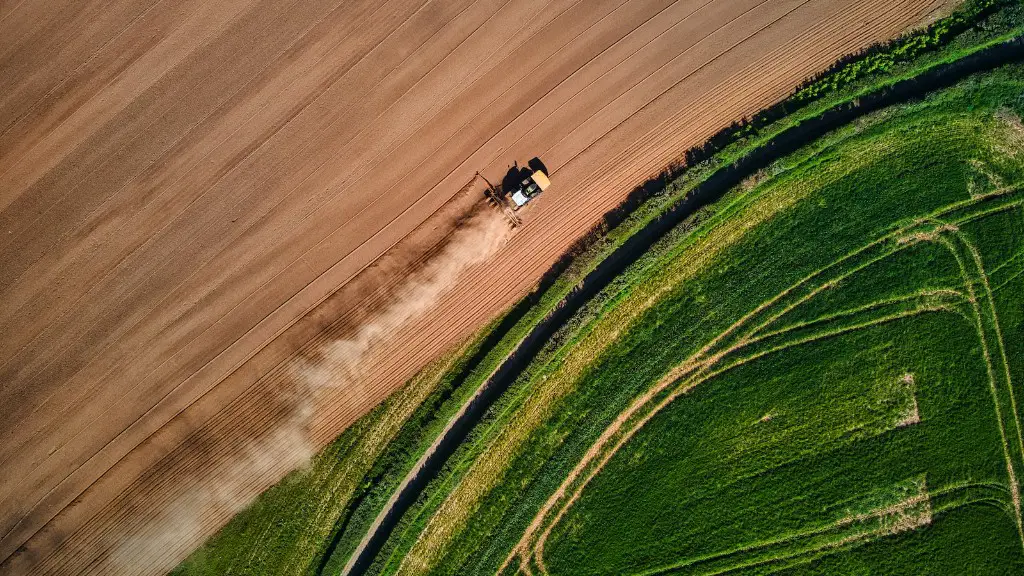Industrial agriculture is a way of producing more food with fewer resources, by applying scientific and technological innovations to traditional farming practices. However, like all methods of food production, industrial agriculture carries certain pros and cons. On one hand, it can be an effective way to produce large quantities of food; on the other hand, it can harm the environment and contribute to the depletion of natural resources.
One of the main advantages of industrial agriculture is that it is able to produce a large amount of food in a relatively short period of time. By using mechanized processes such as equipment and chemicals to speed up the production process and to increase yields, industrial agriculture is able to produce more food faster than more traditional practices. Additionally, industrial agriculture requires fewer labor hours than traditional farming and can help reduce the cost of food for consumers.
One of the main drawbacks of industrial agriculture is that it can cause environmental degradation in the form of air and water pollution. As chemical fertilizers, pesticides, and other substances are used to increase yields, they can seep into the ground and contaminate soil and water supplies. Industrial agriculture is also responsible for large-scale habitat destruction as it leads to the draining of wetlands and the clear-cutting of forests.
Additionally, industrial agriculture is often held responsible for the depletion of natural resources. As it depends heavily on the use of chemical fertilizers and pesticides, the process consumes large amounts of natural resources such as oil and water. Furthermore, the use of industrial agriculture can deplete the soil of its vital nutrients, leading to a decrease in crop yields.
Finally, industrial agriculture can have a negative impact on public health. At times, industrial farming practices lead to the increased use of growth hormones, antibiotics, and other substances that can be harmful to human health. Additionally, the use of pesticides can lead to the contamination of food, which can potentially cause food-borne illnesses.
Economic Impacts Of Industrial Agriculture
Although industrial agriculture may have some drawbacks on the environment, it plays an important role in the global economy. Industrial agriculture can create jobs in rural areas, boost the local economy, and provide employment opportunities for millions of people worldwide. Additionally, it helps support global food security by providing an abundance of food at affordable prices.
Moreover, one of the major benefits of industrial agriculture is that it can help reduce poverty in developing countries. By providing employment opportunities, industrial agriculture has the potential to lift people out of poverty and help them to become self-sustainable. Additionally, it can improve access to food, reduce hunger, and increase nutritional quality by providing access to a variety of nutritious food.
Impact On Land And Labor
Industrial agriculture has also had an impact on land and labor. On one hand, industrial agriculture has led to the displacement of traditional family farms, leading to a decrease in the amount of arable land. This has resulted in a concentration of land in the hands of large agricultural corporations, which limits access for small-scale farmers and puts them in an economically disadvantaged position.
Additionally, industrial agriculture has affected the labor market, as it has increased the demand for migrant workers who are willing to work in less than desirable conditions. This has resulted in the exploitation of migrant workers, as they do not have the same rights as citizens and can be subject to low wages, long work hours, and dangerous working conditions.
Global Impacts Of Industrial Agriculture
Finally, industrial agriculture has had a major impact on the global economy. With the increased availability of affordable food, many countries are able to shift their focus from subsistence farming to industrial production. This has led to a decrease in the size of the agricultural sector and a corresponding increase in the manufacturing and service sectors.
Moreover, industrial agriculture has created trade opportunities for countries around the world. As more countries are able to produce food efficiently and at a low cost, they are able to export their goods to countries with higher incomes. This has helped to increase global markets for food and has stimulated economic growth in many parts of the world.
Impact On Food Quality
The quality of food produced by industrial agriculture can be inconsistent, as the focus is on quantity rather than quality. Industrial agriculture is often associated with the production of processed food and monocultures, which can limit the types of food available to consumers and reduces the variety of plants and animal species that are needed to sustain a healthy ecosystem.
Furthermore, industrial agriculture relies heavily on genetically modified organisms (GMOs) to increase yields and reduce costs. While there is some evidence that GMOs can be beneficial, they may also pose potential health risks, such as allergies or problems with the digestive system. Additionally, there is concern that the presence of GMOs has resulted in the loss of genetic diversity in crops, leading to a reduced ability to adapt to climate change and other environmental pressures.
Impact On Animal Welfare
Finally, industrial agriculture has had an impact on animal welfare. In industrial farming, animals are often kept in close confinement and can suffer from poor nutrition and lack of exercise. Additionally, industrial farms often rely heavily on antibiotics and growth hormones to encourage animal growth, which can lead to potential health risks for both animals and humans.
Additionally, industrial agriculture has contributed to the degradation of animal habitats as rural areas are often converted into industrial farming operations. This has resulted in the loss of wildlife, such as birds and other small creatures, as well as a decrease in the number of predators and herbivores needed to maintain a healthy ecosystem.



